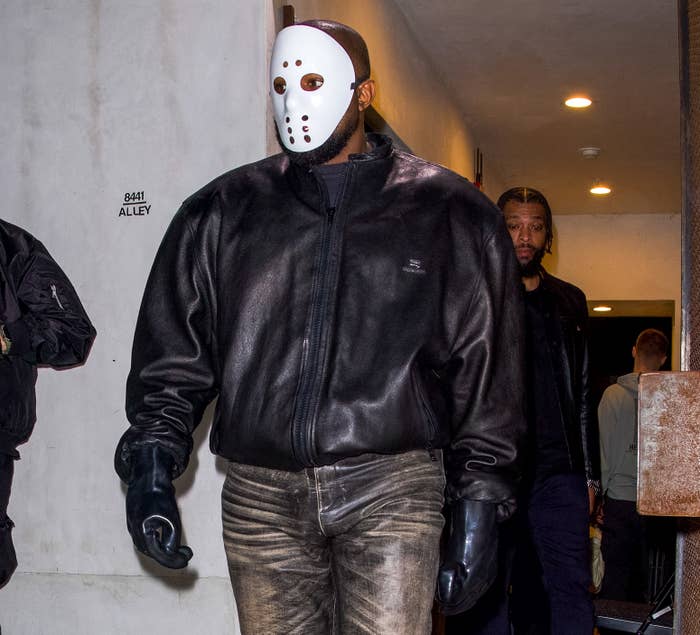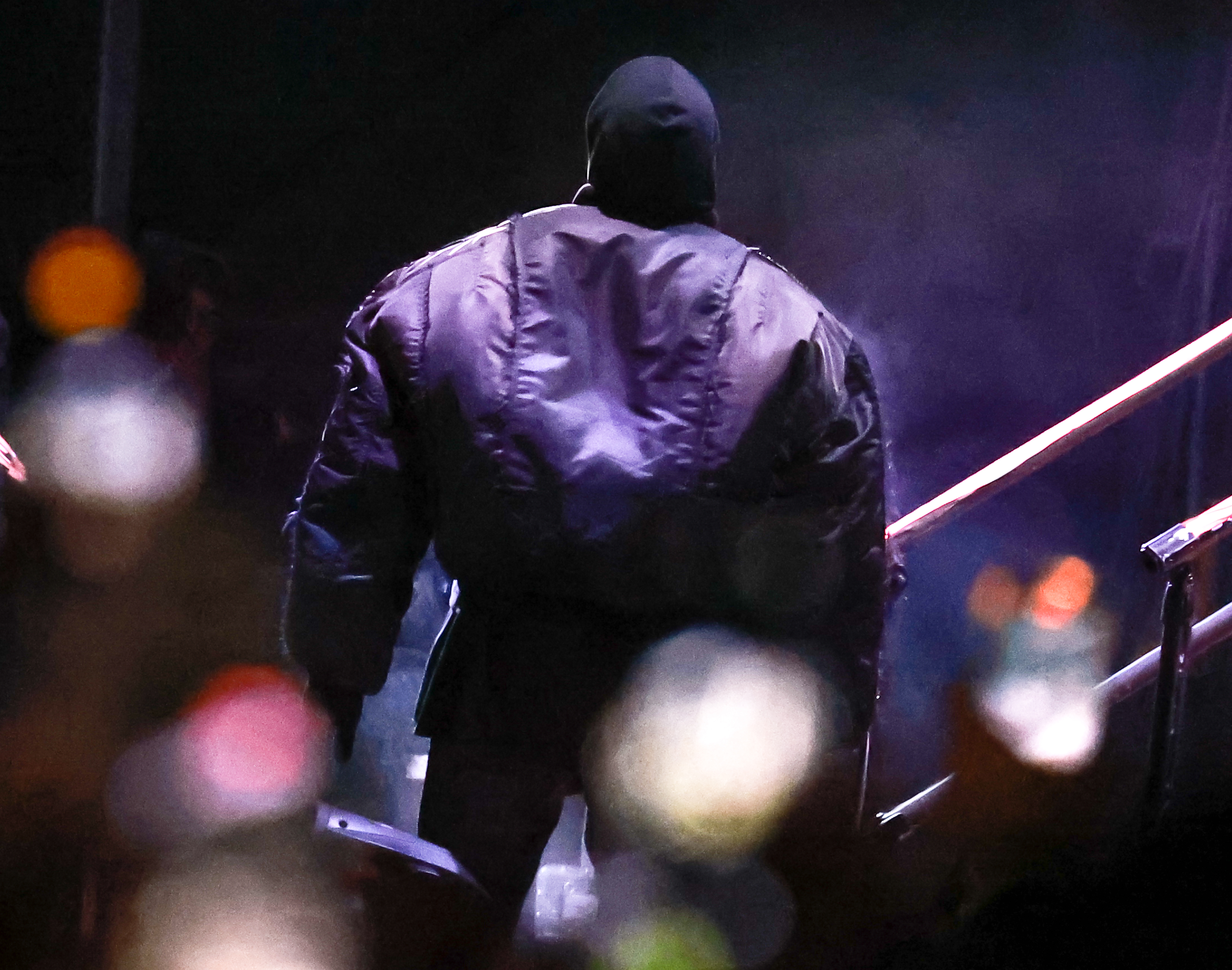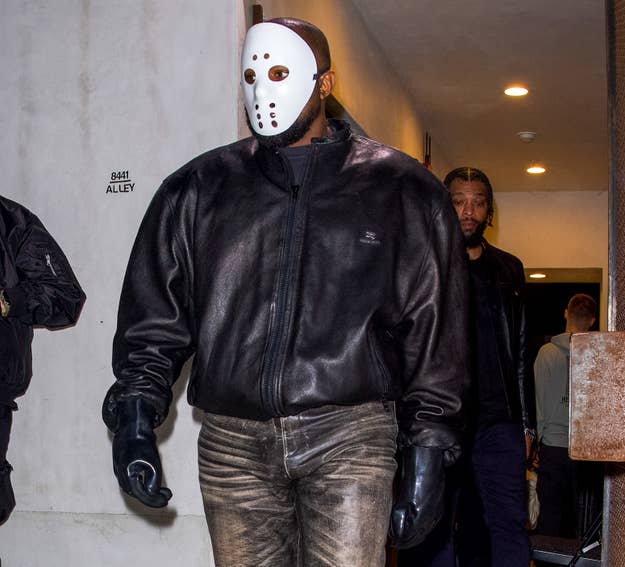
Kanye West has never been above an “I told you so.” For “Last Call,” the final cut on his debut album, The College Dropout, he famously recounts his rise to stardom while sniping all the people and ideas that stood in his way. Twenty years later, he uses the last song on Vultures 1, a joint album with Ty Dolla $ign, to continue his petty streak. Coasting over hazy synths and muffled industrial percussion, he takes aim at everyone who held him accountable for his antisemitism, making mention of a few of the categorizations his name now often lives beside: “'Crazy, bipolar, antisemite’/And I'm still the king.” King is a strong word, but the line is a taunt as much as it is a preview; the LP ascended to the top of the Apple Music chart after its release. His heinous antics and the arrogance accompanying them are more than reason enough to turn away from the polarizing Chicago legend. But Vultures 1’s meticulous production and curatorial wizardry are a reminder of why that’s a lot harder than it looks for some fans.
Combining Yeezy and Dolla $ign’s well-honed chemistry with dynamic soundbeds, the new album stands as perhaps Kanye’s best project since The Life of Pablo. Or maybe Kids See Ghosts. Either way, it’s a departure from the intermittently inspiring, if empty excess of Donda and Donda 2, and Dolla $ign’s own penmanship and soulful vocals help prevent Ye from over-taxing his own voice and getting stale. It’s a mix and match for various eras of Ye, with traces of Yeezus bluster, glossy TLOP melodies, and My Beautiful Dark Twisted Fantasy spontaneity. It’s a return to form for Ye, but expectations for the caliber at which we’d get that were lower than ever. An exercise in ornate chaos, it has a mosaic of expensive samples, sprawling soundbeds, quippy, questionable humor, and scattered indignation. Here, features and sounds are as unexpected as they are functional, engineered to emit apocalyptic euphoria, bulletproof gangster cool or opiate, mesmerizing malaise. Ye and Dolla $ign venture everywhere from cosmic gospel (“Stars”) to pulsing Chicago house (“Paid”), while enlisting Playboi Carti, Freddie Gibbs, Rich the Kid, JPEGMafia, Wheezy, and others to form their own rap Voltron, giving fans yet another reason to re-up on cognitive dissonance.
"Dolla $ign’s own penmanship and soulful vocals help prevent Ye from over-taxing his own voice and getting stale."
For “Back to Me,” Kanye and Dolla $ign fuse a Run DMC sample with a mesmerizing drum loop and a hilarious dude-bro clip from Dogma. Laced with an exquisite Gibbs verse that brims with careening syllables and snarky wordplay, it’s an exhibition for absurdist humor, rich playboy fuckery, and bizarrely infectious song construction. Dolla $ign’s transitional bridge embeds the track with a moment of soulful serenity before Gibbs serves up an asshole-ish verse that rivals Pusha T’s turn on “Runaway.” “Florence to Milan/Just turned a bird bitch to my ex like I was Elon” might just be the best line on the whole project.
This mix of sonic and stylistic cross-pollination doesn’t stop there. Elsewhere, Ye’s musical feng shui helps extract stellar performances from his collaborators. With a warped Koopsta Knicca sample, anthemic Dolla $ign hook, and a subdued, but engrossing Carti feature, “Fuk Sumn” plays out like dystopian Memphis street rap, with Carti’s lower register colors the bassline in an understated tone that only reinforces its sinister cool.
Meanwhile, the album’s title track, “Vultures,” serves up a cross-generational collab with Chicago legends; Bump J delivers icy D-Boy slick talk, while Smerk doles out harsh lessons in street etiquette. And, “Do It” repurposes Juvenile’s “Back That Azz Up” for a modern-day successor, embedding the sample with a sinuous pixelated synth line, Nipsey Hussle vocals, and extra raunchy verses from Dolla $ign, Ye, and YG. It’s a collision of the past and present, but it all feels as futuristic as anything else from New Kanye.

Midway through the project, we’re reunited with Old Kanye. On "Burn," Ye addresses his recent controversies with technical chops and wit that make you remember this is the guy who wrote "Can't Tell Me Nothing.”
Still, he, unfortunately, is more interested in the occasional bad joke than introspection or anything resembling genuine contrition. He’d rather compare himself to Bill Cosby and R. Kelly than reckon with his thoughtless antisemitic tirades. His brazen barbs can be found scattered throughout various points of the album, with each inane punchline serving as a reminder that Ye hasn’t exactly learned his lesson. On “Vultures,” he delivers an especially tacky remark about his recent flurries of antisemitism, rapping, “How I'm antisemitic? I just fucked a Jewish bitch.” That particular line led Ye to issue an apology when fans first heard the track in December, but even that was suspected of being an AI-generated sham.
On “Stars,” ’Ye makes light of antisemitism allegations once more, rapping, “I'ma come through and just black out/Just black out/Keep a few Jews on the staff now.” It’s a petty jab in a time where hate crimes against Jewish people were reported at record highs in the U.S."
For Kanye, moral obligations are less mandatory touchstones of humanity than chains to break free from. It’s a sort of shallow self-martyrdom that occasionally puts dents in an otherwise compelling project. Simultaneously, some of Ye's most powerful moments in Vultures 1 are as much reminders of his self-centeredness as they are the result of it.
On “Carnival,” which sounds like a part 2 of “Hell of a Life,” we get one of the most inspired Rich the Kid performances in years; unfortunately, it’s the product of controversy—and questionable ethics—conjoined with the album and Kanye himself. In a tweet he posted last week, Ozzy Osbourne made it clear that he denied Ye’s request to sample a vocal-less section of Black Sabbath’s 1983 performance of “Iron Man,” citing the rapper’s antisemitism as the reason. In a bit of twisted, practical maneuvering, Kanye just injected “Carnival” with a sample from “Hell of a Life,” a 2010 offering that already includes the necessary clip.
Kanye repeats his nihilistic problem-solving with “Good (Don’t Die).” The late Donna Summers estate claims that Kanye used an unauthorized interpolation of her 1977 single, “I Feel the Love” for the track. According to Summers’ widowed husband, Bruce Sudano, “Kanye changed the words, had someone re-sing it or used AI, but it’s 'I Feel Love.'” If this is true, it’s a move threaded by a misguided idea of revolution—one that positions Ye as the hero of his own twisted self-mythology.
In reality, Kanye is acting as a mad scientist. And if you have qualms about listening to an album from someone who lobbed compliments at Hitler, or if you don’t think you can be a decent person while listening to a man who implied that slavery was a choice, you'll need to perform the same intellectual gymnastics to face his latest LP. After all this, how can you give Donda’s only son one more chance? It would be the latest in what’s been an endless stream of them. Why should you or anyone else give him a platform?
"Kanye is acting as a mad scientist."
It’s an ethical riddle many fans struggle with after each Kanye release. But, in many ways, the 46-year-old is a matter to be engaged with, not ignored. There’s no evil in describing what is and isn’t. As Tupac Shakur once said, “I didn’t create 'thug life,' I diagnosed it.” With Ye, we’re working with an evolving prognosis. But any way you look at it, it’s hard for a doctor to help an injured patient if they won’t even meet them at the hospital. Literally speaking, Ye was diagnosed with bipolar disorder in 2016, and then first claimed he was misdiagnosed two years later. But even if he weren't, it's unclear whether he's interested in the type of help people think they can give him. It’s all connected by flippancy and lack of responsibility that people don’t want to feel like he’s getting away with. After losing multiple endorsement deals and some $1.1 billion of his net worth, you could argue that he usually hasn’t. But with packed stadium listening sessions at his back, you can’t help but think he’s been emboldened.
This struggle is an intellectual and philosophical tug of war. Many will bash him for posting a swastika inside the Star of David on social media and recall the way our illusions of him fell apart. While many will also remember the way “All Falls Down” helped us realize our own imperfections. Meanwhile, many will hear stories of Ye harassing Adidas employees, but can’t forget the way Graduation made them feel like champions—how it made it seem like everyone could grow up without getting old.
A new Ye drop is an album bundle packaged with tantalizing potential and bubbling guilt. Every once in a while, he proves he’s still capable of making gorgeous, immersive music. To interact with it is to come face-to-face with something that can be pretty, but dangerous. But what is art if not for being looked at?

